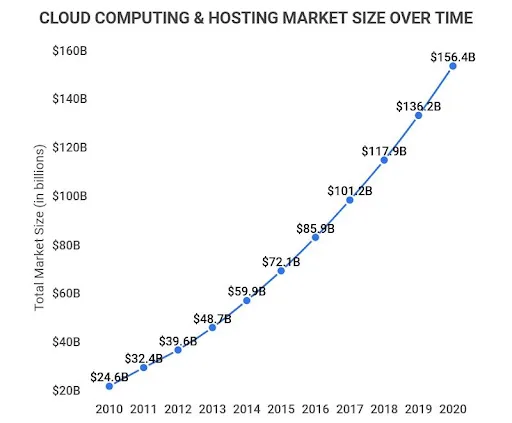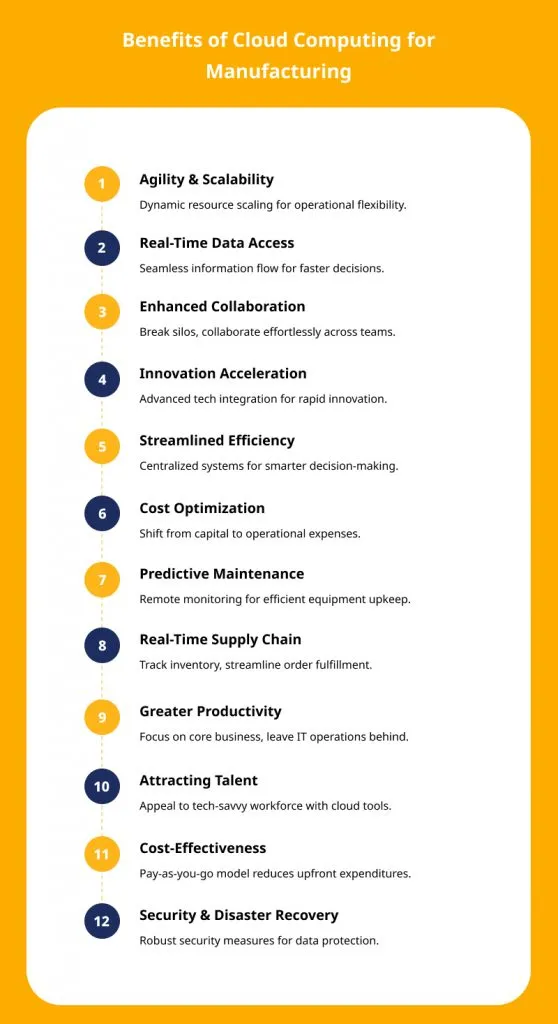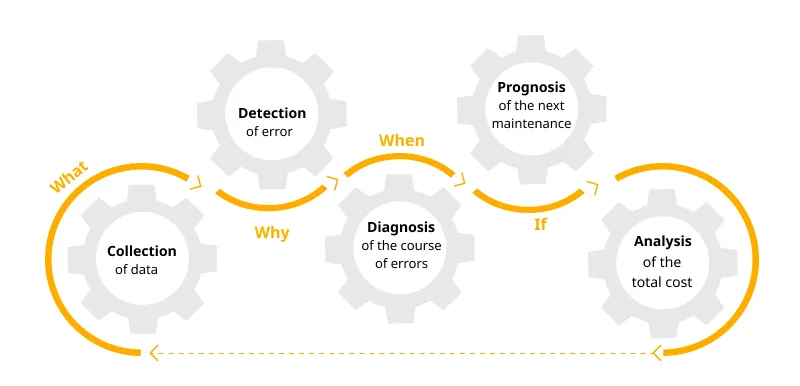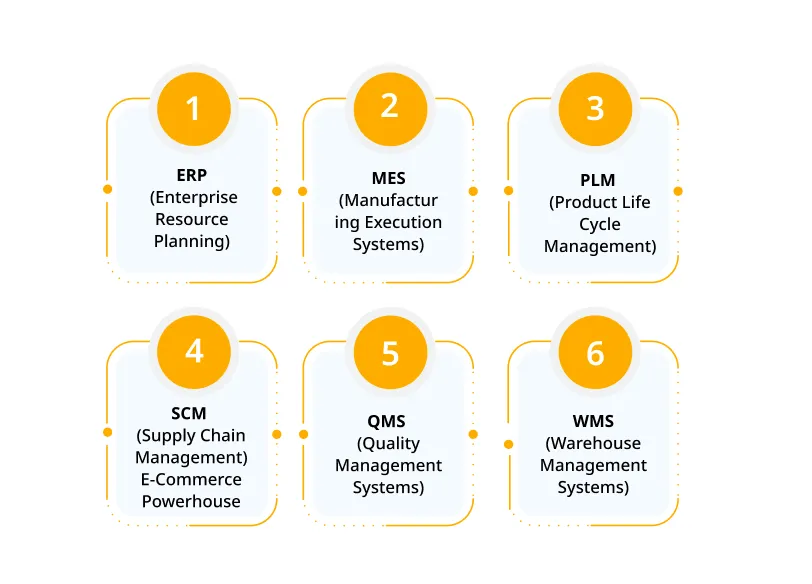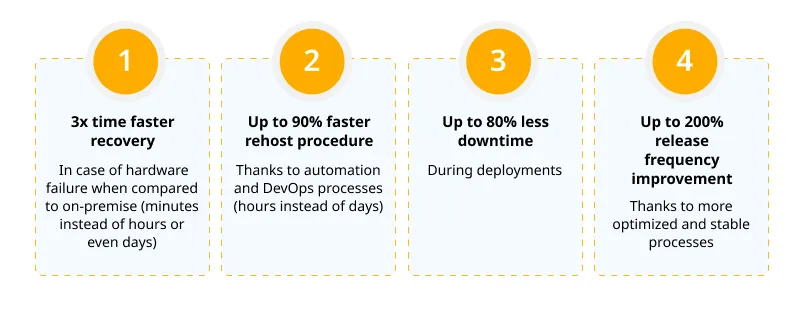Quick Summary:
Today’s manufacturing landscape calls for the ability to innovate while meeting dynamic customer demands rapidly. Cloud computing empowers manufacturers with these abilities by providing them with convenient and affordable on-demand access to computing resources. Cloud-based solutions facilitate greater agility, faster time-to-market, robust collaboration, advanced simulations, insightful analytics, and scalability by eliminating the need for massive on-premise IT infrastructure.
Integrating the latest cloud advancements allows manufacturers to boost productivity, quality, and efficiency to deliver cutting-edge innovations that cement leadership in smart manufacturing.
Manufacturers today face immense pressure to innovate quickly and meet ever-changing customer demands. These rising expectations often leave them questioning how they can leverage technology to stay competitive.
Well, Cloud computing offers powerful solutions to save businesses from the dilemma of staying on the top.
A Gartner report stated that by 2025, over 90% of enterprises will use cloud services to accelerate digital transformation.
The cloud provides on-demand access to computing resources, eliminating the need for massive on-premise IT infrastructure. This enables faster time-to-market and scalability.
Specifically, SaaS solutions give access to the latest design, simulation, production monitoring software tools, and more. The cloud also facilitates data analysis to optimize quality and output.
With insightful analytics and global collaboration, manufacturers can rapidly iterate prototypes and introduce innovations. Cloud computing makes state-of-the-art technology affordable, even for small manufacturers.
Now, the big question is: How can manufacturers use the cloud to boost productivity and beat the competition?
Let’s get into the details to get the answer to this question. Integrating cloud-based solutions is vital to remaining agile, efficient, and at the top of your game. This blog post will guide you on how cloud computing in manufacturing can keep your business on the top.
Benefits of Cloud Computing for Manufacturing
Manufacturing companies swiftly adopt cloud computing with compelling reasons driving this surge. According to Zippia, the global cloud computing and hosting market grew by 535% between 2010 and 2020.
This trend is driven by various factors such as:
1. Improved Agility and Scalability
Traditional on-premises solutions often pose challenges for manufacturers in managing hardware investments. Cloud computing in manufacturing offers a solution by providing flexible and scalable environments.
As a manufacturing business experiences fluctuations in demand or business activities, the cloud infrastructure can quickly scale up or down, ensuring optimal resource utilization without significant upfront investments in hardware.
Break geographical barriers, collaborate seamlessly with our cloud services.
2. Increased Data Accessibility
Real-time data accessibility is a crucial advantage of cloud technology for manufacturers. Professionals from various departments can swiftly access the information they need, regardless of location or time.
This accessibility improves decision-making processes by ensuring that relevant data is readily available, increasing efficiency in day-to-day operations.
3. Improved Collaboration
Cloud-based manufacturing systems foster seamless collaboration by connecting different departments and external stakeholders such as supply chain partners. Centralizing data and operations in the cloud streamlines communication, decision-making, and teamwork. This enhanced collaboration results in higher productivity and shorter time-to-market for manufacturing processes.
4. Increased Innovation
Cloud technology in manufacturing supports advanced capabilities like analytics, machine learning, and the IoT. These features contribute to hastening innovation within the industry. For instance, by leveraging IoT-enabled tracking systems, manufacturers can precisely monitor and trace the location, status, and condition of materials from suppliers, fostering innovation in supply chain management.
5. Greater Efficiency
Cloud-enabled systems integrate data streams from various sources, creating a centralized record system. This centralized approach provides a single source of truth for manufacturers. Streamlining operations through this centralized system is critical for developing insights that drive smarter and faster decision-making. Efficiency gains are a significant advantage of adopting cloud computing in manufacturing.
Also read: Top 20 Cloud Services Companies
6. Reduced Hardware and IT Costs
Manufacturing industry cloud services reduce or eliminate capital expenditures for purchasing and maintaining on-premises equipment. Manufacturers can use cloud-based solutions instead of investing in servers, data storage devices, and data centers, shifting these costs to operating expenses. This model is more manageable and predictable for businesses.
7. Predictive Maintenance
Cloud technology enables manufacturers to monitor equipment remotely using wireless IoT devices. These devices capture real-time data on the health and status of equipment, facilitating predictive maintenance. This capability enhances efficiency in maintaining and replacing machines, extending their lifespans and reducing costs associated with unexpected breakdowns.
Predictive maintenance is made possible by cloud computing.
8. Real-time Supply Chain Management
Cloud-based supply chain solutions empower manufacturers to track inventory levels, supplier details, and logistics in real time. This real-time visibility allows companies to forecast demand, manage inventory effectively, and streamline order fulfillment. Coordinating with suppliers and distributors becomes more seamless, ensuring smoother operations and better customer service.
9. Greater Productivity
By adopting cloud solutions, manufacturers can shift their focus away from traditional IT operations, including hardware purchasing, setup, and maintenance. This shift allows them to concentrate on core business aspects such as innovation, differentiation, promotion, sales, and customer care, ultimately driving greater productivity.
10. Improved Ability to Attract Talent
Young workers accustomed to using digital applications in their personal lives seek similar capabilities in their professional environment. Cloud-based applications provide the convenience and advanced features that attract these workers. Being at the forefront of technology with manufacturing cloud solutions makes a business more appealing to the younger workforce.
11. Better Cost-effectiveness
Manufacturers typically pay for cloud computing technology on a pay-as-you-go model, eliminating upfront hardware expenses associated with on-premises solutions. This model also reduces the need for costly infrastructure upgrades.
Additionally, cloud-based solutions provide automation that optimizes various processes, resulting in greater cost-effectiveness, reduced waste, and more effective resource allocation.
Also read: Top 6 Cloud Computing Trends
12. Increased Security and Disaster Recovery
Cloud applications are less susceptible to cyberattacks than on-premises hardware. Cloud-based manufacturing systems leverage economies of scale to offer high-security solutions and data encryption. This ensures the safety of sensitive company and customer data. Moreover, these security measures contribute to a quicker recovery from disasters or system failures.
By leveraging cloud computing in their business, manufacturers can enhance operational efficiency and position themselves strategically in an era where IT transforms manufacturing.
Stay ahead with the latest cloud computing trends and partner with a reliable cloud application development company for sustained success.
Access real-time data to make informed decisions with our advanced cloud analytics.
Types of Manufacturing Solutions
Leveraging cloud computing in manufacturing can amplify operational efficiency. Let’s explore critical types of manufacturing solutions seamlessly integrated with cloud platforms, unlocking maximum benefits for companies:
1. ERP (Enterprise Resource Planning)
ERP is a comprehensive system that integrates organizational business processes. Its primary goal is to enhance efficiency by centralizing various interconnected services.
Modules encompass finance, procurement, inventory management, production, sales, and HR. Cloud-based ERP systems offer valuable support to manufacturers through:
- Reduction of Redundancy: Eliminating duplications within systems minimizes the need for repetitive data entry and other process efforts. This optimization significantly improves overall operational efficiency.
- Facilitation of Swift Decision-Making: Providing real-time access to critical information for professionals across the business accelerates decision-making processes, promoting agility and responsiveness.
- Cost Reduction: Streamlining processes, particularly in areas like inventory management, procurement, and labor, results in tangible cost reductions, contributing to improved financial efficiency.
- Enhanced Regulatory Compliance: Cloud-based ERP systems are crucial in ensuring compliance with regulatory requirements. This proactive approach reduces the likelihood of fines and penalties, strengthening the organization’s regulatory adherence.
Also read: Building a Tailored ERP System
2. MES (Manufacturing Execution Systems)
Manufacturing Execution Systems (MES) connect ERP systems with real-time manufacturing operations, overseeing and directing production processes. Through MES Software Development, these systems include features like work orders, scheduling, materials tracking, and data collection.
Utilizing cloud-based MES offers manufacturers valuable advantages, including:
- Optimized Production Processes: Cloud-based MES enhances production processes by efficiently managing work orders, allocating resources, and ensuring strict adherence to production standards, promoting smoother operations.
- Elevated Quality and Traceability: Leveraging cloud computing tools, MES systems contribute to improved quality control and compliance, ensuring the maintenance of high-quality standards and comprehensive traceability throughout the manufacturing lifecycle.
- Increased Workforce Efficiency: Cloud-based MES enhances workforce efficiency by intelligently assigning tasks, monitoring team member productivity, and delivering precise instructions to operators, fostering a more streamlined and productive work environment.
- Promotion of Overall Efficiency: By analyzing performance metrics, cloud-based MES systems identify obstacles, inefficiencies, and areas for improvement. This data-driven approach contributes to efficiency enhancements, making operations more effective and responsive to evolving needs.
3. PLM (Product Life Cycle Management)
Product Life Cycle Management (PLM) solutions empower manufacturers to oversee critical product life cycle processes effectively, covering aspects such as design for manufacturing, production enablement, maintenance, and disposal.
Adopting cloud-based PLM delivers valuable advantages to manufacturers:
- Enhanced Collaboration for Dispersed Teams: Cloud-based PLM facilitates seamless collaboration among dispersed product design and dedicated development teams. This collaborative approach accelerates the time-to-market for products.
- Scalability for Diverse Operations: Offering scalability, cloud-based PLM solutions are adaptable to operations of varying sizes, including those experiencing rapid growth. This flexibility ensures that the solutions evolve with the business’s changing needs.
- Anytime, Anywhere Access: Cloud-based PLM enables users to access and manage solutions from any location. This accessibility promotes convenience and flexibility, allowing stakeholders anywhere in the world to stay connected and engaged.
- Cost Reduction Initiatives Support: Cloud-based PLM aids in cost reduction efforts by minimizing upfront and maintenance costs compared to labor-intensive on-premises solutions. This cost-effective approach ensures efficient resource allocation and financial management.
Measured benefits in the product life cycle management (PLM)
4. SCM (Supply Chain Management)
Supply Chain Management (SCM) systems play a pivotal role in enabling manufacturers to enhance the efficiency of their supply chains. Focused on areas such as procurement, inventory management, demand forecasting, and logistics optimization, cloud-based SCM provides manufacturers with the following advantages:
- Enhanced Decision-Making and Customer Service: Cloud-based SCM offers real-time visibility into supply chain data, empowering companies to make informed decisions swiftly. This heightened visibility also improves customer service by ensuring timely and accurate responses to customer needs.
- Flexibility for Changing Business Needs: Cloud-based SCM solutions provide flexibility, easing adaptation to evolving business requirements. Integration with other cloud-based services and applications ensures a responsive and dynamic approach to changing market demands.
- Seamless Collaboration Across the Supply Chain: Cloud-based SCM fosters seamless collaboration with suppliers, distributors, and other partners in the supply chain. This collaborative environment promotes efficient communication and coordination for smoother operations.
- Data-Driven Optimization: Leveraging data and predictive analysis, cloud-based SCM assists companies in optimizing their supply chain operations. This data-driven approach leads to greater efficiency and improved customer care, aligning the supply chain with business objectives.
Embrace cloud computing for a revolutionary manufacturing shift for unparalleled transformation.
5. QMS (Quality Management Systems)
Quality Management Systems (QMS) are instrumental in assisting manufacturers to guarantee that their products meet stringent quality and compliance standards and adhere to regulations.
Cloud-based QMS offers manufacturers valuable benefits, including:
- Ensuring Regulatory Compliance: Cloud-based QMS aids companies in diligently guaranteeing compliance with industry regulations and standards, mitigating the risk of fees and other consequences associated with non-compliance.
- Efficient and Streamlined Processes: By facilitating effective document control and version management, cloud-based QMS contributes to streamlined processes. This ensures that documentation is organized and up-to-date, reducing inefficiencies associated with manual document management.
- Flexibility and Efficiency: Cloud-based QMS allows authorized personnel to access quality data and reports from any location. This flexibility and efficient data retrieval promote streamlined workflows and effective decision-making.
- Effective Planning, Execution, and Tracking: Cloud-based QMS enables manufacturers to plan, execute, and track quality processes efficiently, including internal and external audits. This comprehensive approach ensures that quality procedures are systematically implemented and monitored throughout the organization.
6. WMS (Warehouse Management Systems)
Warehouse Management Systems (WMS) are important in helping manufacturers optimize warehouse operations, encompassing inventory management, order picking, packing, and shipping features. These procedures significantly enhance distribution and logistics processes.
Cloud-based WMS provides manufacturers with the following advantages:
- Global Warehouse Support: Cloud-based WMS offers support for global warehouse operations by granting accessibility to critical data and tools from various locations. This global accessibility ensures warehouse teams can efficiently manage operations regardless of geographical constraints.
- Real-Time Visibility: Cloud-based WMS provides real-time visibility into inventory levels, warehouse operations, and order fulfillment. This immediate access to crucial information enables better decision-making and enhances responsiveness to changing demands within the warehouse.
- Collaboration Enhancement: Facilitating collaboration among warehouse staff, suppliers, logistics partners, and eCommerce collaborators, cloud-based WMS ensures shared access to real-time information on inventory movement and order status. This collaborative environment promotes efficient communication and coordination across the supply chain.
- Operational Streamlining: Cloud-based WMS contributes to the overall efficiency of warehouse operations by automating manual processes, reducing errors, and enhancing accuracy in picking, packing, and shipping. This streamlined approach optimizes the warehouse workflow, improving operational efficiency.

Incorporating these solutions with cloud integration in manufacturing marks a significant step towards embracing Industry 4.0 in manufacturing.
For tailored solutions, consider engaging in custom manufacturing software development and exploring the transformative possibilities of digital transformation services and AI for the manufacturing industry. Embrace the future with innovative cloud-based applications for manufacturing excellence.
Cloud Technology Revolutionizing Manufacturing Operations
In the dynamic evolution of the manufacturing industry, the fusion of technological progress and market shifts demands a strategic approach to operational supremacy.
While traditional on-premises solutions persist, the dominance of cloud-based alternatives has emerged as a transformative force. These cloud solutions offer various advantages, from process streamlining to heightened efficiency and compliance adherence, ultimately elevating competitiveness.
Cloud-based options, including public, private, and hybrid clouds, along with XaaS offerings, allow manufacturers to tailor their infrastructures to unique needs and regulatory obligations. This transformative approach is reshaping manufacturing dynamics by delivering scalability, cost-efficiency, real-time data access, and fostering global collaboration.
Manufacturing solutions, leveraging the prowess of the cloud—such as ERP, MES, PLM, SCM, QMS, and WMS—optimize diverse facets of operations, spanning design, production, supply chain management, and quality assurance. The cloud’s inherent attributes offer unparalleled flexibility, convenience, cost-effectiveness, and security.
In an era where digitalization dominates operational paradigms, adopting cloud-based manufacturing solutions transcends mere choice; it becomes a strategic imperative.
Adopting cloud computing empowers manufacturers to adapt to market dynamics swiftly, respond skillfully to customer needs, and unlock new opportunities for innovation.
Those who leverage these capabilities stay ahead in their manufacturing endeavors and play a pivotal role in shaping the industry’s future.
Embrace the future with cloud solutions for Manufacturing 4.0.
https://youtu.be/53_oFHnolWE?si=Jrf1fDJCo54Itz8V
Conclusion
The rise of cloud computing has emerged as a game-changer in the manufacturing industry. As industries advance digitalization, accepting cloud-based solutions becomes a strategic imperative.
- Enhanced Efficiency: Streamline operations, and boost efficiency.
- Global Collaboration: Foster collaboration, and break geographical barriers.
- Real-time Insights: Access data in real-time, and make informed decisions.
Adopting cloud technology isn’t just staying on top; it’s actively shaping the future of manufacturing. Those leveraging these capabilities are pioneers, influencing the industry’s trajectory.
Ready to Transform? Take the Leap with ValueCoders!
Explore the possibilities of cloud computing in manufacturing with ValueCoders. Transform your operations, stay competitive, and lead the industry into a future of innovation.


